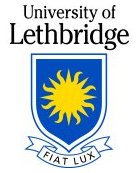Section 1 Welcome
¶Welcome to Math 2565, Accelerated Calculus II. This is the second course in our accelerated stream, which was created to server the Engineering Transfer Program, but is open to any students in Arts and Science meeting the prerequisites.
Students in Math 2565 can expect a more challenging course than Math 2560, the non-accelerated version of Calculus II. This is due not so much to the difficulty level of the problems (although this might be slightly higher), but to the amount of material in the course. We cover all material in Math 2560, in addition to sequences and series, and partial derivatives. Since many students in Math 2565 are coming from Math 1560, there will be a bit of review for Math 1565 students, but expect us to move quickly.
Over the summer, the University of Lethbridge adopted an official recognition of our location on traditional Blackfoot territory. This acknowledgement also serves as a welcome message, and I am pleased to be able to include it here:
Oki, and welcome to the University of Lethbridge. Our University’s Blackfoot name is Iniskim, meaning Sacred Buffalo Stone. The University of Lethbridge acknowledges and deeply appreciates the Siksikaitsitapii peoples’ connection to their traditional territory. We, as people living and benefiting from Blackfoot Confederacy traditional territory, honour the traditions of people who have cared for this land since time immemorial. We recognize the diverse population of Aboriginal peoples who attend the University of Lethbridge and the contributions these Aboriginal peoples have made in shaping and strengthening the University community in the past, present, and in the future.
Subsection 1.1 Course staff
¶My name is Sean Fitzpatrick. You'll see me twice each week in class (right?), and I also handle most of the day-to-day organization. For any questions that you don't find answered in this outline, 1 you can email me at sean.fitzpatrick@uleth.ca, or drop by my office: C540 in University Hall.
Tutorials are handled by Arie Bomhof. He can be found in C510, and emailed at a.bomhof@uleth.ca.
Subsection 1.2 Basic course information
¶- Course website
via Moodle
- Course textbook
-
Our textbook is an OER (open education resource) textbook that I've adopted from the open-source APEX Calculus textbook, by Greg Hartman et al. Greg makes his book available online for free, including the source code used to produce it. For the last year I've been working with Greg and some others to convert the code from the original LaTeX to PreTeXt, which allows us to produce multiple formats, including HTML.
For most people, the most useful version of the text will be the HTML version. This version should look good on phones as well as computers, and has some nice features like embedded videos. However, this version of the book adheres more closely to the original organization of APEX. (And it uses American spelling.)
Students wanting a book that is more precisely adapted to the content of Math 2565, or who want something they can access offline, may prefer the older PDF edition. This version is still based on APEX, but has been edited to match the content of Math 2565 (and use Canadian spelling). There will be minor differences between the two versions, but they are mostly the same. The most substantial difference is in the chapter on differential equations.
If you want to print the book, you can order a copy from the Bookstore, using their print on demand service. If you'd rather print the book yourself, you'll probably want to use the black and white version.
All versions of the book will be posted on Moodle. If for some reason you temporarily lose access to Moodle, all open textbooks that I edit are always available on my website, at www.cs.uleth.ca/~fitzpat/oer.html.
- Class schedule
-
Classes meet Tuesday and Thursday, from 12:15–1:30 pm in SA6010.
Tutorials run on Thursday morning, at 8:00 or 9:25 am in C630, depending on your section.
- Office hours
-
Monday and Wednesday, 10:00 – 11:15 am and 1:15 – 2:45 pm.
If none of those times work you can email me for an appointment. Note however that Tuesday and Thursday I'm in class most of the day, and Friday is often filled with meetings and prep work.
- Grading
Weighting of individual course components is given in Table 2.1. Conversion to letter grades is given in Table 2.2.
